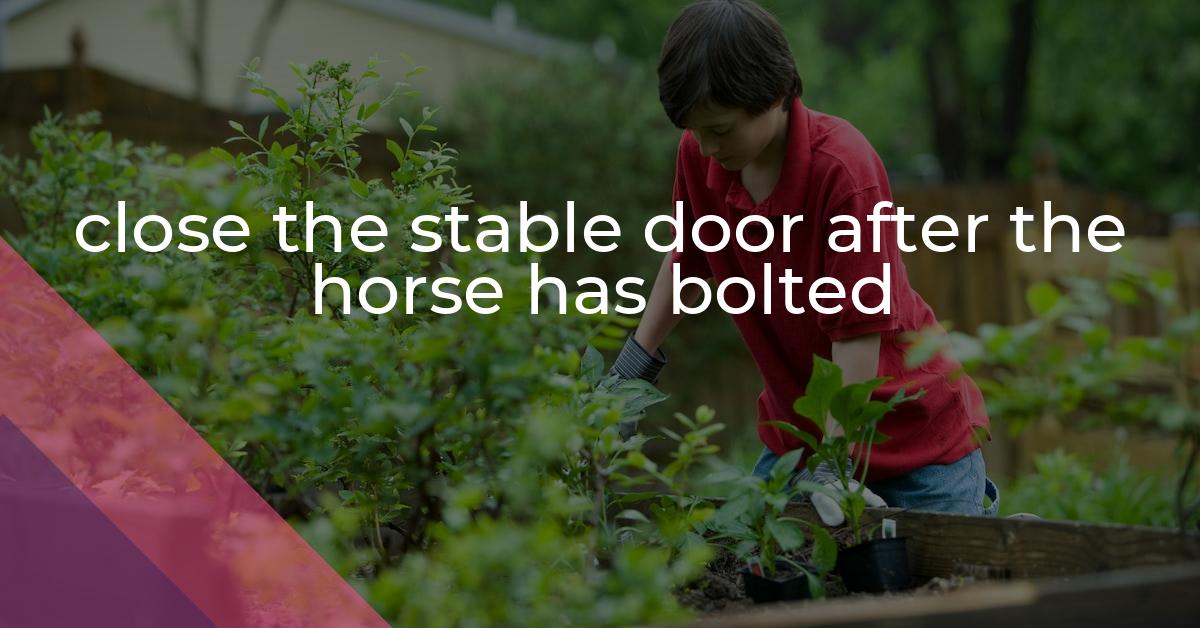close the stable door after the horse has bolted: Idiom Meaning and Origin
What does ‘close the stable door after the horse has bolted’ mean?
The idiom "close the stable door after the horse has bolted" means to take action to prevent something bad from happening, but it is too late because the damage has already been done.

Idiom Explorer
The idiom "last nail in the coffin" refers to a final event or action that ensures the failure or death of something or someone.
The idiom "kick the can down the road" means to delay or postpone addressing a problem or making a decision, often because it is difficult or unpopular to do so at the present time.
The idiom "keep the wolf from the door" means to have enough money or resources to provide for one's basic needs and avoid poverty or hunger.
The idiom "had better" is used to advise or warn someone about a particular action they should take in order to avoid a negative outcome. It implies a sense of urgency or necessity, often indicating that there may be negative consequences if the suggested action is not followed.
The idiom "fix someone's wagon" means to cause trouble for someone, often through punishment or retaliation, in order to teach them a lesson or seek revenge.
The idiom "final nail in the coffin" means an event or action that causes the complete destruction or failure of something, often used to describe the last and decisive blow in a series of setbacks or problems.
"Don't let the door hit you on the way out" means to leave quickly and without causing any inconvenience or problems for others. It is often said in a dismissive or sarcastic manner when someone is not wanted or is being asked to leave a place or situation.
The idiom "dog that caught the car" refers to someone who has achieved a goal but is uncertain about what to do next or ill-prepared to handle the situation. It emphasizes the feeling of being overwhelmed or unprepared for the consequences of one's actions.
The idiom "cross that bridge when one comes to it" means to deal with a problem or worry when it actually happens, rather than worrying about it in advance.
Origins Unveiled
The idiom "close the stable door after the horse has bolted" is a well-known phrase that emphasizes the importance of being proactive and taking action before problems arise. It is often used to convey the idea that addressing a problem only after it has occurred is ineffective and pointless. This idiom is widely used in various contexts to remind us of the value of foresight and prevention.
Originating from the world of horses and stables, this idiom draws on the image of a horse escaping from its stable. Once the horse has bolted, or run away, attempting to close the stable door is futile because the damage has already been done. The proverbial lesson here is that taking action after the fact is often too little, too late.
The idiom "close the stable door after the horse has bolted" is related to the idiom "after the fact." Both phrases convey the idea that addressing a problem or taking action only after it has occurred is ineffective. They serve as reminders that it is better to be proactive and prevent problems before they happen. By being proactive, we can avoid the need to rectify a situation that has already gone wrong.
The earliest recorded usage of this idiom can be traced back to the mid-19th century, appearing in various forms such as "shutting the stable door after the steed is stolen" or "locking the stable door after the horse is stolen." While the exact origin remains uncertain, it is likely that the idiom emerged from an understanding of the consequences of neglecting to secure a stable properly, resulting in the horse's departure.
The idiom "close the stable door after the horse has bolted" is also related to the idiom "close on the heels of." This phrase refers to events or actions that happen quickly after one another. Just as the horse bolts and then the stable door is closed, events that occur "close on the heels of" each other happen in rapid succession. It reflects the importance of being attentive and taking timely action to prevent problems from escalating.
Today, the idiom "close the stable door after the horse has bolted" is widely used in everyday conversation, literature, and news media. It serves as a cautionary reminder that it is better to address a problem or take precautions beforehand than to try and rectify the situation once the damage has already occurred. This idiom emphasizes the value of foresight, prevention, and timely action.
The idiom "close the stable door after the horse has bolted" is also connected to the idiom "behind closed doors." This phrase refers to actions or events that occur in secret or away from public view. Just as the stable door is closed behind the horse, actions that happen "behind closed doors" are often hidden from public scrutiny. This idiom reminds us to be aware of the potential consequences of secretive actions and to strive for transparency and openness.
By exploring the origin and meaning of the idiom "close the stable door after the horse has bolted," we can gain valuable insight into the importance of proactive measures. It serves as a reminder to anticipate and prevent problems before they escalate. While the idiom's message may seem straightforward, it carries a powerful lesson that transcends time and contexts. Let us consider the wisdom embedded in this seemingly simple metaphor and strive to apply its teachings to our own lives.
Example usage
Examples of how the idiom "close the stable door after the horse has bolted" can be used in a sentence:
- He tried to install a security system after the robbery; it's like closing the stable door after the horse has bolted.
- The company implemented strict safety measures only after a workplace accident occurred, which is essentially closing the stable door after the horse has bolted.
- They decided to address the issue of pollution in their city years after it became a serious problem, which is similar to closing the stable door after the horse has bolted.
More "Prevention" idioms



